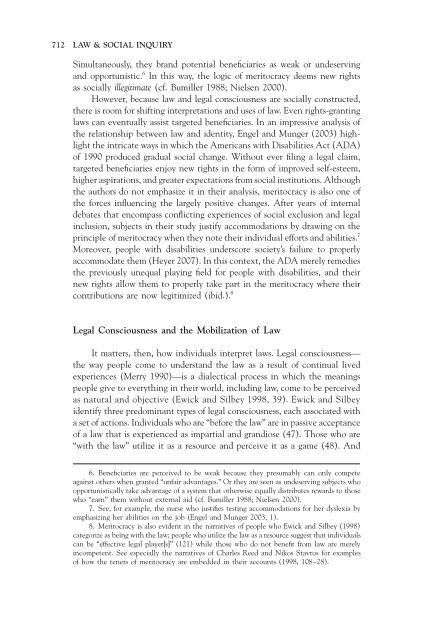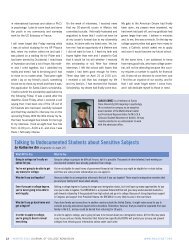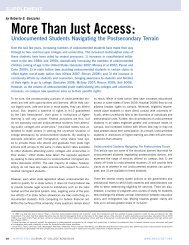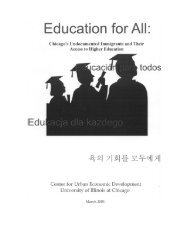Legitimacy, Social Identity, and the Mobilization of Law: The Effects ...
Legitimacy, Social Identity, and the Mobilization of Law: The Effects ...
Legitimacy, Social Identity, and the Mobilization of Law: The Effects ...
You also want an ePaper? Increase the reach of your titles
YUMPU automatically turns print PDFs into web optimized ePapers that Google loves.
712LAW & SOCIAL INQUIRYSimultaneously, <strong>the</strong>y br<strong>and</strong> potential beneficiaries as weak or undeserving<strong>and</strong> opportunistic. 6 In this way, <strong>the</strong> logic <strong>of</strong> meritocracy deems new rightsas socially illegitimate (cf. Bumiller 1988; Nielsen 2000).However, because law <strong>and</strong> legal consciousness are socially constructed,<strong>the</strong>re is room for shifting interpretations <strong>and</strong> uses <strong>of</strong> law. Even rights-grantinglaws can eventually assist targeted beneficiaries. In an impressive analysis <strong>of</strong><strong>the</strong> relationship between law <strong>and</strong> identity, Engel <strong>and</strong> Munger (2003) highlight<strong>the</strong> intricate ways in which <strong>the</strong> Americans with Disabilities Act (ADA)<strong>of</strong> 1990 produced gradual social change. Without ever filing a legal claim,targeted beneficiaries enjoy new rights in <strong>the</strong> form <strong>of</strong> improved self-esteem,higher aspirations, <strong>and</strong> greater expectations from social institutions. Although<strong>the</strong> authors do not emphasize it in <strong>the</strong>ir analysis, meritocracy is also one <strong>of</strong><strong>the</strong> forces influencing <strong>the</strong> largely positive changes. After years <strong>of</strong> internaldebates that encompass conflicting experiences <strong>of</strong> social exclusion <strong>and</strong> legalinclusion, subjects in <strong>the</strong>ir study justify accommodations by drawing on <strong>the</strong>principle <strong>of</strong> meritocracy when <strong>the</strong>y note <strong>the</strong>ir individual efforts <strong>and</strong> abilities. 7Moreover, people with disabilities underscore society’s failure to properlyaccommodate <strong>the</strong>m (Heyer 2007). In this context, <strong>the</strong> ADA merely remedies<strong>the</strong> previously unequal playing field for people with disabilities, <strong>and</strong> <strong>the</strong>irnew rights allow <strong>the</strong>m to properly take part in <strong>the</strong> meritocracy where <strong>the</strong>ircontributions are now legitimized (ibid.). 8Legal Consciousness <strong>and</strong> <strong>the</strong> <strong>Mobilization</strong> <strong>of</strong> <strong>Law</strong>It matters, <strong>the</strong>n, how individuals interpret laws. Legal consciousness—<strong>the</strong> way people come to underst<strong>and</strong> <strong>the</strong> law as a result <strong>of</strong> continual livedexperiences (Merry 1990)—is a dialectical process in which <strong>the</strong> meaningspeople give to everything in <strong>the</strong>ir world, including law, come to be perceivedas natural <strong>and</strong> objective (Ewick <strong>and</strong> Silbey 1998, 39). Ewick <strong>and</strong> Silbeyidentify three predominant types <strong>of</strong> legal consciousness, each associated witha set <strong>of</strong> actions. Individuals who are “before <strong>the</strong> law” are in passive acceptance<strong>of</strong> a law that is experienced as impartial <strong>and</strong> gr<strong>and</strong>iose (47). Those who are“with <strong>the</strong> law” utilize it as a resource <strong>and</strong> perceive it as a game (48). And6. Beneficiaries are perceived to be weak because <strong>the</strong>y presumably can only competeagainst o<strong>the</strong>rs when granted “unfair advantages.” Or <strong>the</strong>y are seen as undeserving subjects whoopportunistically take advantage <strong>of</strong> a system that o<strong>the</strong>rwise equally distributes rewards to thosewho “earn” <strong>the</strong>m without external aid (cf. Bumiller 1988; Nielsen 2000).7. See, for example, <strong>the</strong> nurse who justifies testing accommodations for her dyslexia byemphasizing her abilities on <strong>the</strong> job (Engel <strong>and</strong> Munger 2003, 1).8. Meritocracy is also evident in <strong>the</strong> narratives <strong>of</strong> people who Ewick <strong>and</strong> Silbey (1998)categorize as being with <strong>the</strong> law; people who utilize <strong>the</strong> law as a resource suggest that individualscan be “effective legal player[s]” (121) while those who do not benefit from law are merelyincompetent. See especially <strong>the</strong> narratives <strong>of</strong> Charles Reed <strong>and</strong> Nikos Stavros for examples<strong>of</strong> how <strong>the</strong> tenets <strong>of</strong> meritocracy are embedded in <strong>the</strong>ir accounts (1998, 108–28).






